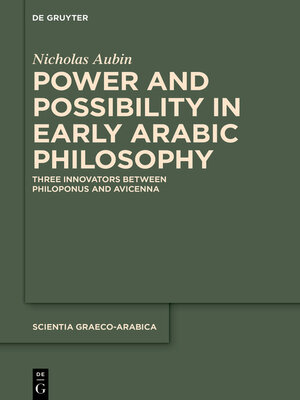Power and Possibility in Early Arabic Philosophy
ebook ∣ Three Innovators Between Philoponus and Avicenna · Scientia Graeco-Arabica
By Nicholas Allan Aubin

Sign up to save your library
With an OverDrive account, you can save your favorite libraries for at-a-glance information about availability. Find out more about OverDrive accounts.
Find this title in Libby, the library reading app by OverDrive.



Search for a digital library with this title
Title found at these libraries:
| Library Name | Distance |
|---|---|
| Loading... |
"The world is a finite body, and therefore has finite power." John Philoponus is remembered for using this Aristotelian premise to break ranks with Aristotle and argue that the world is not everlasting. This investigation reconsiders Philoponus's arguments from finite power, and then explores the aftermath of this line of thinking in the works of three lesser-known Arabic intellectuals active in the generation before Avicenna (d. 1037): Abū l-Ḫayr Ibn Suwār (d. after 1017), Abū al-Ḥasan al-ʿĀmirī (d. 992), and Abū Sahl al-Masīḥī (d. after 1025). Each engaged with this dictum in unique and novel ways, and in so doing anticipated a number of central features of Avicenna's writings. The history of this argument is of crucial importance for understanding the evolution of natural philosophy and metaphysics in this formative period, away from tedious and simplistic arguments about creation and towards a more robust modal ontology based on intrinsic and extrinsic necessity.







